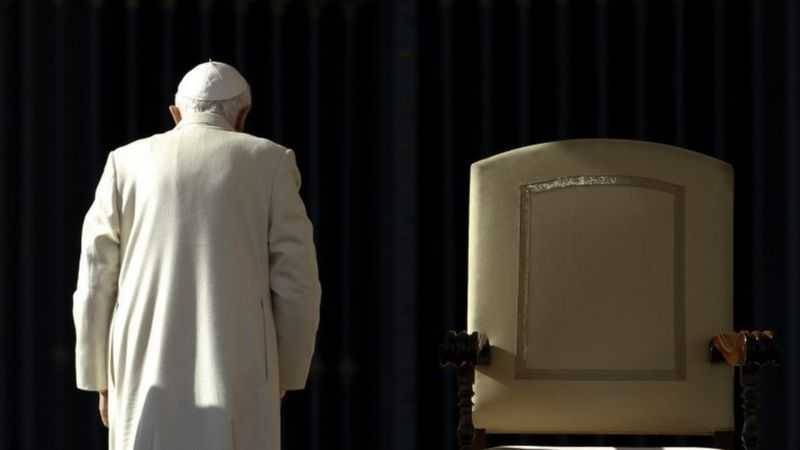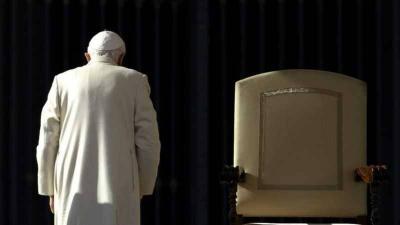Today, the world bids farewell to the late Pope Benedict XVI in a solemn funeral at the Vatican. His Holiness had requested that his funeral be modest, as stated by Father Abdo Kassem, the head of the Catholic Media Center, in an interview with Voice of Lebanon, noting that "the pope will be buried under the altar of St. Peter's Basilica in the Popes' Crypt." He also clarified that "the pope was strict with himself and those who worked with him, which is why he was sometimes described as intolerant." He emphasized that "the years he served the Church were with diligence and humility, and he surprised everyone with his resignation, which stemmed from existing problems or health issues."
**Biography:** The former Pope Benedict XVI passed away at the age of 95 at his residence in the Vatican, as stated in a Vatican announcement. His election as Pope Benedict XVI, although widely anticipated, took place in April 2005, marking a rapid and controversial rise for Joseph Ratzinger. Supporters of Benedict, the 265th pope in Catholic history, portrayed him as an intellectual who exerted great effort to preserve the spiritual legacy left by Pope John Paul II. However, his opponents viewed Benedict as the chief advocate and guardian of the Church's strict positions on various issues such as abortion and contraception. The anger he sometimes provoked seemed predictable for someone who never hesitated to disturb people if he believed something needed to be said or done.
Ratzinger was 78 years old when he ascended the throne of St. Peter, and thus, age and illness shortened his papacy. In 2013, he announced his intention to resign, becoming the first pope to voluntarily leave the position in over 600 years. Joseph Aloisius Ratzinger was born into a conservative Catholic family on April 16, 1927, in Bavaria, Germany. His father was a police officer with what his son later described as "simple rural roots." His youth was largely intertwined with World War II, as he was forced to join the Hitler Youth and served in an anti-aircraft artillery unit protecting a BMW factory outside Munich. Later, he participated in digging anti-tank trenches before deserting the military and surrendering to the Allies at the end of the war. Ratzinger said of that period, "During three days of marching, we walked on an empty road in a line that gradually became endless. Young American soldiers were taking pictures of us to take back home as a memento of a broken army and its miserable soldiers."
Ratzinger studied theology at the University of Munich from 1946 to 1951, and in June 1951, he and his brother Georg were ordained priests. After completing his doctoral degree in theology, Father Ratzinger became a university professor teaching doctrine and fundamental theology at several universities, including those in Freising, Bonn, and Münster. At that time, Ratzinger was one of the strong supporters of the liberal reform program that guided the Second Vatican Council.
**Traits:** Pope Benedict XVI was a reformer in his early life, but his health had been declining before his election, and the responsibilities of the papacy added to that. It was later revealed that a heart rhythm device was implanted in him in 2005. He became the first pope to resign since Pope Gregory XII in 1415. On February 11, 2013, the pope informed his cardinals of his intention to leave office due to his advanced age and declining health.
Pope Benedict XVI believed, just like his mentor and role model Pope John Paul II, in the existence of a complete Christian alternative to the human philosophies that emerged in the twentieth century, such as Marxism, materialism, and liberalism. His belief in the inevitability of Christianity's triumph can be summarized in his words that Christianity "must rise anew just like mustard seeds, in the form of small communities whose members live in intense struggle against all sources of evil in the world while showing what is good."
Pope Benedict XVI was an educated, kind, and gentle man. He could play the piano and had a particular appreciation for the music of Mozart and Brahms, and he was proficient in eight languages, including German, English, French, Italian, Portuguese, and Spanish. Most of Pope Benedict's legacy had already been put into practice even before his relatively short papacy began, as he and his predecessor Pope John Paul II set the Catholic Church on a path that would be followed for many years to come.




